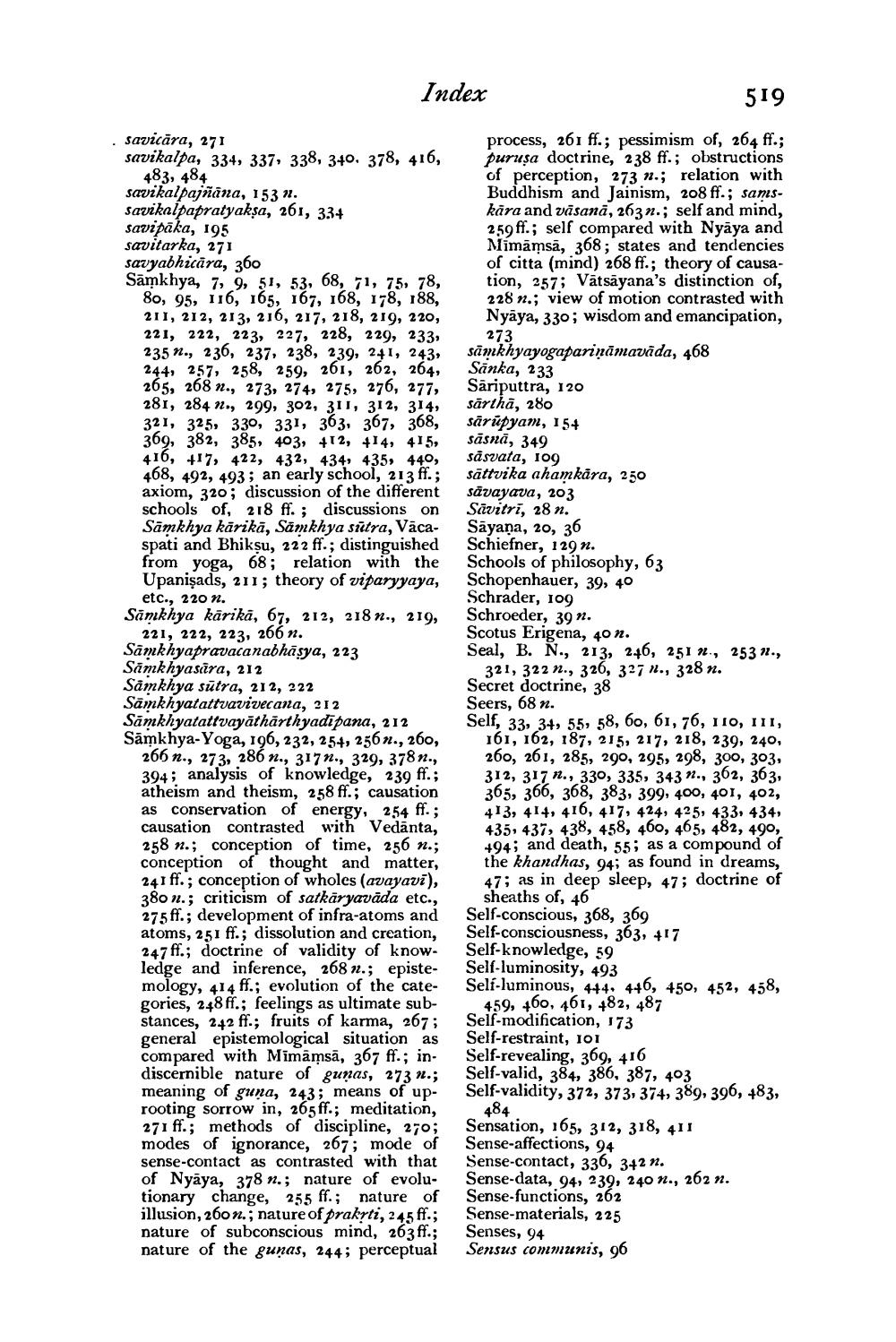________________
Index
savicāra, 271
savikalpa, 334, 337, 338, 340, 378, 416, 483, 484 savikalpajñāna, 153 n. savikalpapratyakṣa, 261, 334 savipaka, 195 savitarka, 271 savyabhicara, 360 Samkhya, 7, 9, 51, 53, 68, 71, 75, 78, 80, 95, 116, 165, 167, 168, 178, 188, 211, 212, 213, 216, 217, 218, 219, 220, 221, 222, 223, 227, 228, 229, 233, 235 2., 236, 237, 238, 239, 241, 243, 244, 257, 258, 259, 261, 262, 264, 265, 268 n., 273, 274, 275, 276, 277, 281, 284 22., 299, 302, 311, 312, 314, 321, 325, 330, 331, 363, 367, 368, 369, 382, 385, 403, 412, 414, 415, 416, 417, 422, 432, 434, 435, 440, 468, 492, 493; an early school, 213 ff.; axiom, 320; discussion of the different schools of, 218 ff.; discussions on Samkhya kärikä, Sämkhya sutra, Vācaspati and Bhiksu, 222 ff.; distinguished from yoga, 68; relation with the Upanisads, 211; theory of viparyyaya, etc., 220 n.
Samkhya kārikā, 67, 212, 218 m., 219, 221, 222, 223, 266 n. Samkhyapravacanabhāṣya, 223 Samkhyasara, 212 Samkhya sutra, 212, 222 Samkhyatattvavivecana, 212 Samkhyatattvayatharthyadipana, 212 Samkhya-Yoga, 196, 232, 254, 256., 260,
266 n., 273, 286 n., 3172., 329, 378n., 394; analysis of knowledge, 239 ff.; atheism and theism, 258 ff.; causation as conservation of energy, 254 ff.; causation contrasted with Vedanta, 258 n.; conception of time, 256 n.; conception of thought and matter, 241 ff.; conception of wholes (avayavi), 380.; criticism of satkāryavada etc., 275 ff.; development of infra-atoms and atoms, 251 ff.; dissolution and creation, 247 ff.; doctrine of validity of knowledge and inference, 268.; epistemology, 414 ff.; evolution of the categories, 248 ff.; feelings as ultimate substances, 242 ff.; fruits of karma, 267; general epistemological situation as compared with Mimāmsā, 367 ff.; indiscernible nature of gunas, 273 n.; meaning of guna, 243; means of uprooting sorrow in, 265 ff.; meditation, 271 ff.; methods of discipline, 270; modes of ignorance, 267; mode of sense-contact as contrasted with that of Nyaya, 378 n.; nature of evolutionary change, 255 ff.; nature of illusion, 2602.; nature of prakrti, 245 ff.; nature of subconscious mind, 263 ff.; nature of the gunas, 244; perceptual
519
process, 261 ff.; pessimism of, 264 ff.; puruşa doctrine, 238 ff.; obstructions of perception, 273 .; relation with Buddhism and Jainism, 208 ff.; sams kāra and vāsanā, 263n.; self and mind, 259 ff.; self compared with Nyaya and Mimämsä, 368; states and tendencies of citta (mind) 268 ff.; theory of causation, 257; Vatsayana's distinction of, 228 n.; view of motion contrasted with Nyaya, 330; wisdom and emancipation,
273
samkhyayogapariṇāmavāda, 468 Sänka, 233 Säriputtra, 120 sārtha, 280 sārupyam, 154 sāsnā, 349 säsvata, 109
sättvika ahamkara, 250 sävayava, 203 Săvitrī, 28 n.
Sāyaṇa, 20, 36 Schiefner, 129 n. Schools of philosophy, 63 Schopenhauer, 39, 40 Schrader, 109
Schroeder, 39 n. Scotus Erigena, 40 n.
Seal, B. N., 213, 246, 251 2., 2532., 321, 322 2., 326, 327 ., 328 n. Secret doctrine, 38
Seers, 68 n.
Self, 33, 34, 55, 58, 60, 61, 76, 110, 111, 161, 162, 187, 215, 217, 218, 239, 240, 260, 261, 285, 290, 295, 298, 300, 303, 312, 317., 330, 335, 343 2., 362, 363, 365, 366, 368, 383, 399, 400, 401, 402, 413, 414, 416, 417, 424, 425, 433, 434, 435, 437, 438, 458, 460, 465, 482, 490, +94; and death, 55; as a compound of the khandhas, 94; as found in dreams, 47; as in deep sleep, 47; doctrine of sheaths of, 46
Self-conscious, 368, 369 Self-consciousness, 363, 417 Self-knowledge, 59
Self-luminosity, 493
Self-luminous, 444, 446, 450, 452, 458, 459, 460, 461, 482, 487 Self-modification, 173 Self-restraint, 101 Self-revealing, 369, 416 Self-valid, 384, 386, 387, 403 Self-validity, 372, 373, 374, 389, 396, 483, 484
Sensation, 165, 312, 318, 411 Sense-affections, 94 Sense-contact, 336, 342 n. Sense-data, 94, 239, 240 n., 262 n. Sense-functions, 262
Sense-materials, 225 Senses, 94 Sensus communis, 96




